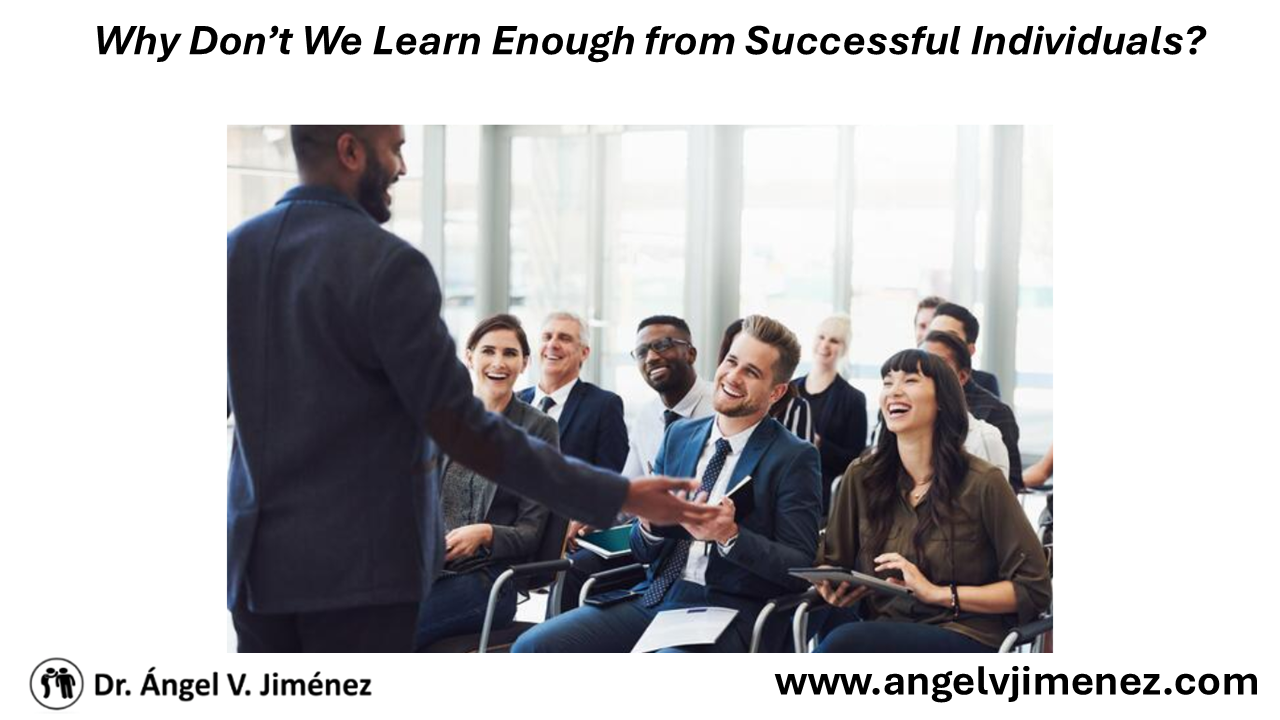Success leaves clues, and both personal development and evolutionary science experts agree: learning from the best is a powerful yet underused strategy. Here’s a deep dive into the evidence from personal development and evolutionary human science.
Personal Development for Rational Minds
Why We Don’t Learn Enough from Successful Individuals
Although we are surrounded by success stories and examples of people who have reached the top, we often encounter internal barriers, such as a lack of motivation, or external ones, such as the inaccessibility of successful individuals, which prevent us from learning enough from those who have achieved success.
What are the reasons holding us back, and what can we do to overcome these barriers?
This article explores some of the reasons behind this phenomenon and, most importantly, offers strategies to overcome these obstacles and effectively learn from successful individuals.

1.- Lack of Motivation: Do We Really Want to Learn?
One of the most common reasons we don’t learn enough from successful individuals is a genuine lack of motivation. This happens because our priorities are often not aligned with learning.
For example, people who attend evening classes often do so more for social or recreational reasons than to learn something that will radically transform their lives. While these motivations are valid, they explain why we do not always actively seek the knowledge that would take us further.
Additionally, not everyone wants to become a “success beast.” However, they often want to enjoy some of the benefits of others’ success, such as gaining financial advantages. As Robert Kiyosaki notes in Rich Dad, Poor Dad:
“I have several friends who have generated over a billion dollars in their short lifetimes. The three of them report the same phenomenon: Their friends who have no money have never come to them to ask them how they did it. But they do come asking for one of two things, or both: a loan, or a job.”
Practical Exercise:
|
2.- The Inherent Difficulty of Complex Learning
The evolutionary science of social learning explains that learning from others is less costly than learning individually. However, learning from the best is not as simple as copying someone’s answers on an exam.
For example, imagine you admire Slash, the legendary guitarist from Guns N’ Roses. Even if you wear his iconic hat or use the same guitar, you will never be able to play like him unless you first dedicate hours to mastering the basics.
Anthropological studies suggest that complex learning occurs in two stages:
- Learning from accessible figures. In the early stages, we learn from those close to us, such as parents, friends, or peers.
- Learning from experts. Once we reach an intermediate level, we can benefit from studying the best in the field.
This implies that attempting to learn directly from the most successful individuals without first developing some basic competency can be a waste of time.
Learning Hack:
|
3. Inaccessibility: When the Best Are Out of Reach
Another significant barrier is the difficulty of accessing successful individuals, as they tend to be extremely busy, and their schedules do not always allow time to help others.
However, not all successful individuals are unreachable. As Fraser Doherty notes in 48-Hour Startup:
“Throughout my career, I’ve been amazed at how willing successful entrepreneurs are to share what they’ve learned with those who are trying to climb up the ladder behind them.”
In my personal experience, getting professional advice from successful scientists is relatively easy.
The key is knowing how to approach them. Many successful people enjoy sharing their knowledge with those who show genuine interest and a willingness to learn.
Strategies to Overcome Inaccessibility:
|
4.- Envy and Resentment: The Invisible Enemy of Learning
Envy and resentment toward successful individuals are powerful psychological barriers. These feelings prevent us from admiring and learning from people who have achieved goals we have yet to reach.
Some economists suggest that envy toward the wealthy is a key factor behind the prevailing anti-capitalist attitudes in certain intellectual circles. Additionally, studies in evolutionary psychology have shown that envy plays a significant role in supporting government policies aimed at wealth redistribution.
A similar phenomenon occurs in the romantic sphere. Many men and women feel envious and resentful toward those who are more popular or successful in the romantic and sexual marketplace. This attitude deprives them of valuable opportunities to learn from these more attractive or popular individuals, which could be invaluable in improving their own appeal.
Mario Luna, in Psicología del Éxito, offers a clear solution:
“Replace envy with admiration. Envy programs you for failure; admiration, for success.”
Achieving this shift requires conscious effort. Instead of negatively comparing yourself to others, use their success as a source of inspiration for your own personal growth.
Mario Luna himself recounts in his first book, Sex Code, how he once envied a physically unattractive and non-wealthy man who had incredible success with women. Later, he transformed his envy into admiration, which led him to learn a great deal from that man and motivated him to keep improving in the field of seduction.
Practical Exercise:
|
5. Poor Learning Ability
Learning from others requires specific skills, such as identifying relevant information, integrating it with your previous knowledge, and applying it effectively. Many people have not developed these skills enough, making it difficult for them to maximize the lessons from successful individuals.
An experimental study I previously mentioned on this website showed that the people who learn best from successful individuals are also those who are good at learning independently. Therefore, improving your overall learning ability will enhance your ability to benefit from social learning.
| Recommended book to improve your learning ability: If you want to improve your learning ability, Ultralearning by Scott H. Young is a great resource. It offers practical strategies for intensive, self-directed learning. Young suggests creating focused learning projects and engaging in high-impact simulations to acquire skills quickly. |
6.- Egocentric Discounting: Ignoring Valuable Knowledge from Others
Egocentric discounting is the tendency to give more value to information we obtain ourselves than to information provided by others.
For example, an entrepreneur might ignore a mentor’s advice on avoiding common mistakes, thinking their situation is unique. This phenomenon is widespread and well-documented in psychological studies on social learning and the acceptance of advice.
Why does it happen? One probable cause is that information obtained firsthand is often perceived as more relevant than information from others. However, egocentric discounting often prevents people from reaching higher levels of success by disregarding valuable insights from more successful individuals.
Learning Hack: Each time you receive advice, ask yourself:
Remember: Recognizing the value of others’ experiences can save you time and help you avoid costly mistakes. |
Remember: Recognizing the value of others’ experiences can save you time and help you avoid costly mistakes.
Final Reflection: Start Today and Share the Knowledge
What can you do today to learn from someone successful? Maybe send a message, read a book about their journey, or analyse their strategies in more detail. The important thing is to start breaking down the barriers that prevent you from making the most of these opportunities.
But don’t stop there. Think about who else in your circle could benefit from these ideas. Sharing this article with a friend, colleague, or family member could help them overcome their own obstacles—and strengthen your learning and growth network. Because when we share knowledge, we all grow.
Dr. Ángel V. Jiménez
Ángel V. Jiménez is passionate about personal development, scientific psychology, and the analysis of human behavior from an evolutionary perspective. He earned his PhD at the University of Exeter (UK), where he studied the processes of status acquisition and interpersonal influence, and the role of prestige in social learning. After completing his doctorate, he conducted postdoctoral research at Brunel University London and the University of Exeter. He currently teaches quantitative psychology, combining his academic expertise with his passion for scientific outreach. Through this website, he shares practical and thought-provoking content on personal development, psychology, and evolutionary science, helping you better understand human nature and apply this knowledge effectively to improve your life.
References
These are the materials I consulted to prepare this article. Interested readers can review them to delve deeper into the topics discussed.
Books
Doherty, F. (2016). 48-hour startup. From idea to launch in 1 weekend. Thorsons.
Kiyosaki, R. (2011). Rich Dad Poor Dad. Plata Publishing.
Luna, M. (2015). Psicología del Éxito.
Luna, M. (2008). Sex Code. El manual práctico de los maestros de la seducción. Nowtilus.
Mises, L. (2015). The anti-capitalist mentality. BN Publishing.
Young. S.H. (2019). Ultralearning. Accelerate Your Career, Master Hard Skills and Outsmart the Competition. Thorsons.
Blog Posts
Jiménez, Á.V. (2025). Social Learning: How to Select Your Learning Sources. Dr Ángel V. Jiménez
Jiménez, Á.V. (2025). Learning from the Best: A Success Secret or an Evolutionary Instinct?. Dr Ángel V. Jiménez
Scientific Research
Jiménez, Á. V., & Mesoudi, A. (2019). Prestige-biased social learning: Current evidence and outstanding questions. Palgrave Communications, 5(1), 1-12.
Lin, C.-A., & Bates, T. C. (2021). Who supports redistribution? Replicating and refining effects of compassion, malicious envy, and self-interest. Evolution & Human Behavior, 42(2), 140-147.
Mesoudi, A. (2011). An experimental comparison of human social learning strategies: payoff-biased social learning is adaptive but underused, Evolution & Human Behavior, 32, 334-342.
Morin O., Jaquet, P.O., Vaesen, K. & Acerbi, A. (2021). Social information use and social information waste. Philosophical Transitions of the Royal Society.
Smith, H. J., Pettigrew, T. F., Pippin, G. M., & Bialosiewicz, S. (2012). Relative Deprivation: A Theoretical and Meta-Analytic Review. Personality and Social Psychology Review, 16(3), 203-232.
Sznycer, D., Lopez Seal, M. F., Sell, A., Lim, J., Porat, R., Shalvi, S., Halperin, E., Cosmides, L., & Tooby, J. (2017). Support for redistribution is shaped by compassion, envy, and self-interest, but not a taste for fairness. Proceedings of the National Academy of Sciences, 114(31), 8420-8425.
RECENT POSTS
No More Overworking: Strategies for Sustainable Productivity
If you’re a knowledge worker—be it an academic, streamer, author, artist, or consultant— it is very likely that you largely possess the autonomy to structure your time and priorities. While this freedom offers immense potential, it frequently engenders an unintended...
Social Learning Strategies: How to Select Your Learning Sources
Not all social learning is equal: choosing the right sources can make all the difference. The evolutionary science of social reveals powerful strategies for selecting who to learn from. Here’s a deep dive into the evidence and how to apply each strategy effectively.
Affiliate Disclosure
This website participates in the Amazon Affiliate Program and other affiliate programs, which means I may receive a commission for purchases made through affiliate links. This does not affect the price you pay and helps me keep the content free and high quality. I appreciate your support.




